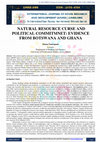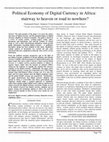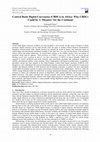Papers by Danaa Nantogmah

International Journal of Novel Research and Development , 2023
This article employs principal component analysis (PCA) technique to construct a Multidimensional... more This article employs principal component analysis (PCA) technique to construct a Multidimensional Political Commitment Index (MIDPC Index) to measure government commitment to prudent natural resource governance. It finds that except for economic diversification, Botswana exhibits very strong government commitment to resource governance, fiscal sustainability and social impact, while Ghana displays evidence of very weak government commitment in resource governance indices, fiscal sustainability indices and social impact indices but a very strong commitment to economic diversification albeit this index is on a declining trajectory. Additionally, it finds that Botswana's success in escaping the resource curse might largely be credited to the civicconscience approach (Botho) imbued in Batswana culture, existence and adherence to national vision, civic-conscience leadership; while Ghana remains a resource curse trapped nation because of the absence of national culture and national vision, excessive partisanship without a national development plan, civic-conscience deficiency in leadership with high levels of inefficiency, rentseeking, corruption and mismanagement.

The main purpose of the paper is to assess the nature and types of digital currency and the poten... more The main purpose of the paper is to assess the nature and types of digital currency and the potential impact of digital currency adoption on African economies. The paper is based on a review of various articles, working papers, books, policy documents and legislations, and relevant websites of central banks as well as other international institutions which provide public information regarding digital currency. A qualitative descriptive design has been adopted in this study. Qualitative content analysis of documents was carried out and semistructured interview conducted to elicit the views of five (5) key informants. From the political economy perspective and in the light of prevailing economic conditions of chronic inflation and national currency volatility with the prospects of 'digital dollarization, the paper argues that Africa ought to launch a single regional digital currency or a digital currency payment platform to address its negative impact rather than the issuance of national CBDCs which has the tendency to magnify the national fiat currency volatility in the digital economy. Additionally, the paper shows that digital currency average per transaction cost is 103.5 times cheaper than Sub-Saharan Africa average cost. It is also 65.5 times and 51.4 times cheaper than the digital remittance index and the global SmaRT average cost respectively. Furthermore, the paper demonstrates that digital currency adoption and spread in Africa is irreversible and Africa governments and regulators should adopt a regional approach to regulation, rather than regulate against digital assets, embrace and invest in robust research into digital currency ecosystem. Finally, in view of the limited research into digital currency adoption and its impact, design and technology options in Africa, the need for future research agenda to focus in these areas cannot be over emphasized.

Research Journal of Finance and Accounting , 2021
Central bank digital currencies (CBDCs) are been designed a ‘new normal’ for the world of finance... more Central bank digital currencies (CBDCs) are been designed a ‘new normal’ for the world of finance in which payments (digital currency) can be made directly from one party to another without financial intermediaries regardless macroeconomic links. Digital currency has ushered the world of finance into uncharted waters as central banks and international institutions crumble to fine their feet’s in a fast moving stream of decentralised finance (DeFi) and global stablecoins. As central banks embark on the CBDCs journey, there are number of questions which must be address: What problems are CBDC’s expected to solve? How do current design thinking resolve these problems in Africa? Are there alternatives to CBDCs in Africa? Broadly, CBDCs are expected to resolve inefficient and costly domestic and cross-border payments and settlement, ensure price stability and financial stability, retain monetary policy independence and digital de-dollarization. A qualitative descriptive design has been adopted in this study.
Findings. Central bank digital currencies (CBDCs) well-designed in a new multilateral fair and just international monetary architecture has the potential to ensure price stability and financial stability in both advanced and developing economies in general, but more importantly would enable developing countries to regain some among of monetary policy independence. However, under the CBDCs design thinking within the framework of existing international monetary and financial architecture, no economy in Africa can withstand the powers of BigFintech, DeFi, global stablecoins and foreign sovereign digital currencies. This paper concludes that African countries must decide whether to cede their sovereign power to an independent monetary authority with single digital currency to manage under their control or cede their economic and financial destiny to unaccountable foreign BigFintech and/or foreign sovereign CBDCs in form of digital dollarization.
Keywords: digital currency, CBDCs, digital dollarization, international monetary system, Africa
NATUR by Danaa Nantogmah









Uploads
Papers by Danaa Nantogmah
Findings. Central bank digital currencies (CBDCs) well-designed in a new multilateral fair and just international monetary architecture has the potential to ensure price stability and financial stability in both advanced and developing economies in general, but more importantly would enable developing countries to regain some among of monetary policy independence. However, under the CBDCs design thinking within the framework of existing international monetary and financial architecture, no economy in Africa can withstand the powers of BigFintech, DeFi, global stablecoins and foreign sovereign digital currencies. This paper concludes that African countries must decide whether to cede their sovereign power to an independent monetary authority with single digital currency to manage under their control or cede their economic and financial destiny to unaccountable foreign BigFintech and/or foreign sovereign CBDCs in form of digital dollarization.
Keywords: digital currency, CBDCs, digital dollarization, international monetary system, Africa
NATUR by Danaa Nantogmah
Findings. Central bank digital currencies (CBDCs) well-designed in a new multilateral fair and just international monetary architecture has the potential to ensure price stability and financial stability in both advanced and developing economies in general, but more importantly would enable developing countries to regain some among of monetary policy independence. However, under the CBDCs design thinking within the framework of existing international monetary and financial architecture, no economy in Africa can withstand the powers of BigFintech, DeFi, global stablecoins and foreign sovereign digital currencies. This paper concludes that African countries must decide whether to cede their sovereign power to an independent monetary authority with single digital currency to manage under their control or cede their economic and financial destiny to unaccountable foreign BigFintech and/or foreign sovereign CBDCs in form of digital dollarization.
Keywords: digital currency, CBDCs, digital dollarization, international monetary system, Africa